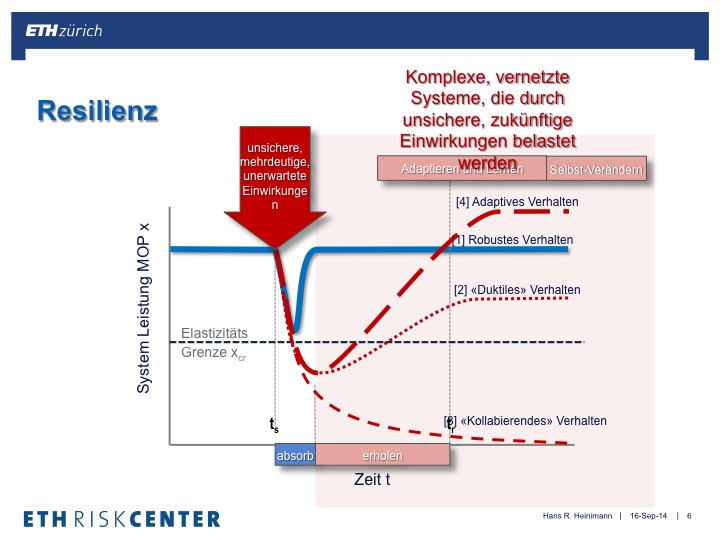
Am 1. November 2014 erfolgt der Start des Forschungsprogramms «Future Resilient Systems» (zukunftsfähige, resiliente Systeme), das die ETH Zürich gemeinsam mit dem Paul Scherrer Institut (PSI), der National University of Singapore (NUS), der Nanyang Technological University (NTU) und der Singapore Management University (SMU) konzipierte und durchführen wird. Dabei geht es darum, neue Ansätze zu entwickeln, um komplexe Systeme robuster, fehlertoleranter, oder eben resilienter zu machen.
Die Wohlfahrt und die Entwicklung innovations-basierter Länder hängt von kritischen Infrastruktursystemen ab, die das Rückgrat für die Versorgung mit Energie-, Transport-, Kommunikations-, Bank-, Finanz- oder Notfall-Leistungen bilden, um den «Stoffwechsel» moderner Gesellschaften aufrecht zu erhalten. Diese Systeme haben sich von isolierten Anlagen in ein komplexes Netzwerk entwickelt, in dem die Wechselwirkungen das Verhalten des Gesamtsystems bestimmen. Wir verstehen das Verhalten derartiger, komplexer Netzwerke erst ansatzweise, und wir benötigen neue Ansätze, um Strategien zu entwickeln, diese robuster und fehlertoleranter zu machen.
Resilienz ist der Antagonist von Resistenz, die bisher das Leitkonzept für die Gestaltung und Bemessung von Systemen war. Das resistenz-orientierte Gestalten ist solange zweckmässig, als es möglich ist, die Grenzzustände der massgebenden Einwirkungen statistisch zuverlässig zu charakterisieren. Die zunehmende Komplexität als Folge der Vernetzung führt dazu, dass vermehrt «Ausreisser»-Einwirkungen zu beobachten sind, die auch als «Black Swans» oder «Dragon Kings» bezeichnet werden. Wir benötigen deshalb eine neue Gestaltungsphilosophie jenseits von Resistenz und Stabilität. Resilienz ist die Fähigkeit eines Systems, Störungen und Schocks zu absorbieren und sich derart zu reorganisieren, dass seine Strukturen, Funktionen und Feedback-Schleifen erhalten bleiben oder verbessert werden. Während sich Resistenz auf das Absorbieren beschränkt, sind die essenziellen Funktionen von Resilienz das Wiederherstellen der Strukturen und Funktionen oder allenfalls die Selbst-Veränderung, die zu angepassten Strukturen, Funktionen und Feedback-Schleifen führt. Das Bestreben, die Wiederherstellungs- und Selbst-Veränderungsfähigkeit von Systemen zu verbessern, ist der Kern des Resilienz-Konzepts, der zu grösserer Fehlertoleranz und Robustheit führt.
Hans Rudolf Heinimann ist Professor am Institut für Terrestrische Ökosysteme und massgeblich beteiligt an Aufbau und Durchführung des zweiten Forschungsprogramms des Singapore-ETH-Centres (SEC).